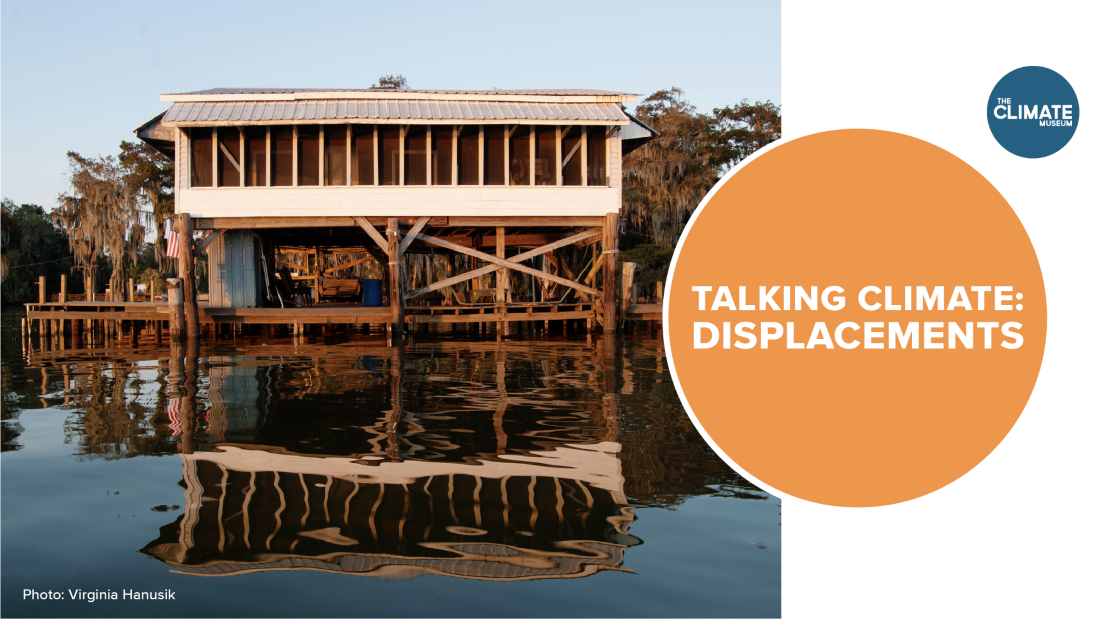A Cultural Institution Taking Action on Climate and Inequality: The Climate Museum in New York City
López’s analysis highlights another feature of the Talking Climate series: namely, that it makes space for the specificity of different forms of inequality and their interrelation. It allows for a constellation of concerns to be held together in considering the nuances of what forms of inequality may look like in a given situation. While the climate crisis is global in scale and requires global solutions, it is also intimate, specific, and local and requires local solutions, too. The Talking Climate series asks implicitly: What would the work of substantive repair entail? It also highlights the work of people who are actively engaged in that repair. The series treats expertise itself as interdisciplinary and stemming from multiple domains of experience. By showcasing the work of a broad variety of people who have devoted their lives to taking action on climate and inequality, the series also demonstrates how the panelists are actively working toward solutions, and how these solutions, gains, and victories are significant and necessary.
Looking ahead, the Talking Climate series aims to continue exploring new themes—like labor on November 5, 2021—while also returning to and building upon previous conversations. While the discussions are very timely given the climatic impacts we see in the news or in the new research that is published, many of the events also have an evergreen quality. The inequalities featured in the series run deep and require returning to for further consideration and analysis. We are hoping to circulate the series alongside the resource guides, along with further reading on the subject matter curated for each event (under the Climate Museum blog), to educators who could incorporate the materials into their lesson plans on climate. Hosting the series online during the pandemic has yielded an archive of video recordings that can be distributed and circulated asynchronously, which is an accessible feature of the online platform. In future series programming, as we consider in-person options, we would also like to maintain an engaging digital record of each discussion. These are important as educational tools and for documenting the discussions of the most pressing concerns of the moment.
Ultimately, the Climate Museum’s discussion series on themes at the intersection of climate and inequality, Talking Climate, evinces the qualities of what Christiana Figueres describes as “stubborn optimism”: a “relentless commitment” (Figueres 2020) (*25) to building interdisciplinary conversations for deep understanding of the most pressing issues that affect the world today, conceptualizing those conversations as galvanizing movement toward action on the part of those who experience this museum programming. There is no time like the present to take action on climate—the feeling of urgency is omnipresent, and the agency is in our hands.
(*25) to building interdisciplinary conversations for deep understanding of the most pressing issues that affect the world today, conceptualizing those conversations as galvanizing movement toward action on the part of those who experience this museum programming. There is no time like the present to take action on climate—the feeling of urgency is omnipresent, and the agency is in our hands.
Acknowledgements: I thank Katharina Anzengruber and Elke Zobl for their invitation to contribute to this special issue and for their generous engagement and comments. Thanks are also due to Philip Friedrich and Miranda Massie for their invaluable input. In addition to myself, the Talking Climate team at the Climate Museum is: Akua Banful, Miranda Massie, Margaret O’Donnell, Saskia Randle, and current and former interns Nina Castro-Sauer and Evan Lim. It has been a pleasure to curate this discussion series together with them.
Header Photo: Talking Climate: Displacements photo by Virginia Hanusik, design by Saskia Randle
Dilshanie Perera ( 2021): A Cultural Institution Taking Action on Climate and Inequality: The Climate Museum in New York City. In: p/art/icipate – Kultur aktiv gestalten # 12 , https://www.p-art-icipate.net/a-cultural-institution-taking-action-on-climate-and-inequality-the-climate-museum-in-new-york-city/



 Artikel drucken
Artikel drucken